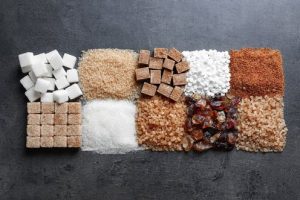Just a teaspoon of Sugar…
We have all heard how bad sugar is for us, but do you know why?
Sugar occurs naturally in all foods that contain carbohydrates, such as fruits and vegetables, grains, and dairy. Consuming whole foods that contain natural sugar can be okay in moderation. These foods release the sugar slowly which offers a steady supply of energy to your cells.
Problems occur when you consume too much added sugar. This includes sugar that food manufacturers add to products to increase flavour or extend shelf life. Or you add yourself to cereal, tea and coffee etc.
Some of the top culprits of added sugars are soft drinks, fruit drinks, flavoured yogurts, cereals, cookies, cakes, lollies, and most processed foods. But sugar is sneaky and is present in things you may not think. Some examples include soups, breads, sauces most packaged items.
Sugar has been linked to many health problems such as:
May Increase Your Risk of Heart Disease – Sugar can lead to higher blood pressure, inflammation, weight gain, diabetes, and fatty liver disease. These symptoms are all linked to an increased risk for heart attack and stroke.
May produce acne – Sugary foods quickly spike blood sugar and insulin levels, causing increased androgen secretion, oil production and inflammation. All of which play a role in acne development
Increases your risk for diabetes – A high-sugar diet may lead to obesity and insulin resistance, both of which are risk factors for diabetes.
Increase your risk of cancer – Too much sugar can lead to obesity, insulin resistance and inflammation, all of which are risk factors for cancer.
Increases risk of obesity – Excessive sugar consumption has been linked to weight gain, as it provides a major and unnecessary source of calories with little or no nutritional value. Increase your risk of depression – Blood sugar swings, neurotransmitter dysregulation and inflammation may all be reasons for sugar’s detrimental impact on mental health.
Decrease energy – High-sugar foods can negatively impact your energy levels by causing a spike in blood sugar followed by a crash.
Tips to reduce sugar in your diet:
- Focus on eating whole, unprocessed foods. This means trying to avoid packaged foods.
- Swap soft drinks, energy drinks, juices and sweetened teas for water or unsweetened mineral water with lemon. 1 cup of OJ (250ml) contains 21g sugar (approx. 6 tsp). 1 cup of Coke (250ml) contains 27g sugar. Maximum guideline for sugar in men is 37.5g sugar per day (9 tsp). 2 cups of OJ is 12 tsp!! Women – 25g and 6 tsp.
- Drink your coffee black or use Stevia as a sweetener.
- Sweeten plain yoghurt with fresh or frozen berries instead of buying flavoured yoghurt.
- Consume whole fruits instead of dried fruits.
- Replace lollies with a homemade trail mix of fruit, nuts and a few dark chocolate chips.
- Use olive oil and vinegar in place of sweet salad dressings like honey mustard.
- Look for cereals with under 15% sugar.
- Swap your morning cereal for a bowl of rolled oats topped with nut butter and fresh berries, or an omelette made with fresh greens.
- Use natural nut butters in place of sweet spreads like Nutella or jam.
- Prepare your own healthy meals at home and avoid buying foods and drinks that are high in added sugar.
For more information or to book a personal consultation please do not hesitate to contact me.
Kasey Boorman – Nutritionist – (Bachelor of Health Science, Nutrition)

